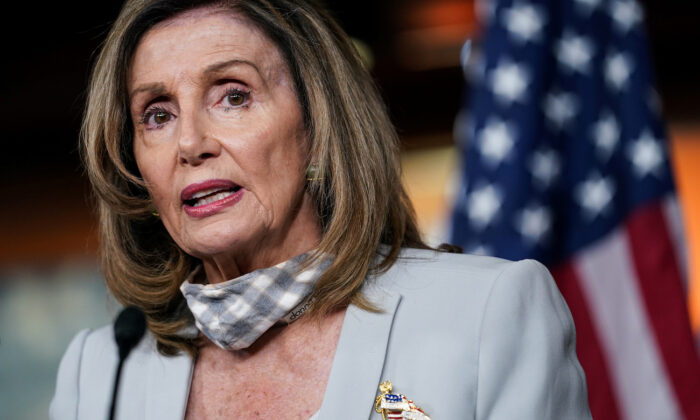House Speaker Nancy Pelosi (D-Calif.) said Tuesday morning that she is against GOP efforts to pass a smaller stimulus package, adding that Democrats are not willing to pass the deal now and reconvene on outstanding issues later.
“There is no later with this administration,” she said referring to the Trump administration. “This is the opportunity. And the skinny deal is a Republican bill: That’s not a deal at all,” Pelosi added. “They’re making a skinny—in fact, [Sen.] Chuck Schumer and I call it an emaciated—proposal for a massive problem.”
“We can fiscally spend the appropriate amount of money to meet the needs of the American people,” she said in an interview. “And by the way: It’s stimulus. We are a consumer economy and the more we have, whether it’s food stamps or unemployment insurance … that is stimulus to the economy.”
Pelosi’s comments are the latest in a series of critical comments and accusations lodged by both Democrats and Republicans over a CCP (Chinese Communist Party) virus relief deal. Talks between Pelosi, Schumer, and White House officials stalled last month, with federal funding for state and local governments being the most significant hurdle.
Pelosi, in the interview, again said that Republicans should pass the $3.4 trillion HEROES Act, which includes nearly $1 trillion in state and local funding. That bill would also include a broader distribution of $1,200 payments and would extend the $600 weekly federal unemployment benefits.
Treasury Secretary Steven Mnuchin in recent weeks has said the White House doesn’t want to pass the HEROES Act and also rejected Democrats’ proposals to reduce the bill by about $1 trillion.
Republicans in the Senate voted on their own “skinny” bill, which is worth about $300 billion, but they failed to overcome a 60-vote hurdle to send the measure to the Senate floor for debate.
Pelosi’s insistence to pass a deal that includes broader stimulus measures might put some House and Senate Democrats at risk during the November elections, as GOP candidates in vulnerable areas could highlight the Senate’s efforts in recent days while simultaneously pointing to Democrats’ insistence on a larger bill.
Meanwhile, Senate Majority Leader Mitch McConnell (R-Ky.) and Mnuchin, in the past week, both stated that it may not be likely that a relief deal will be made ahead of the November elections. President Trump last week also accused Democrats of not being willing to pass any deal, alleging they view any deal as being beneficial to his reelection chances.
McConnell said on Fox News that Democrats rejected smaller aid bills because they “want to wait until after the election and play games with this.”
“Nancy Pelosi and Schumer don’t want to pass a stimulus bill because they think that helps me in the election,” said President Trump on Sept. 10. “I don’t think it helps me at all. We are prepared to pass stimulus for people that need it. ”
On Tuesday, a group of about 50 Republican and Democratic lawmakers are slated to unveil a $1.5 trillion CCP virus measure.
“This is just a framework to hopefully get the negotiators back to the table,” Rep. Josh Gottheimer (D-N.J.), the co-chair of the bipartisan Problem Solvers Caucus, said ahead of the unveiling of the measure. That proposal includes $1,200 checks, unemployment benefits, and $500 billion for local and state governments.
Focus News: Democrats, Republicans Point Fingers Over Relief Deal Impasse
US Government Issues Draft Amendment to Cut Reliance on Russian Uranium
